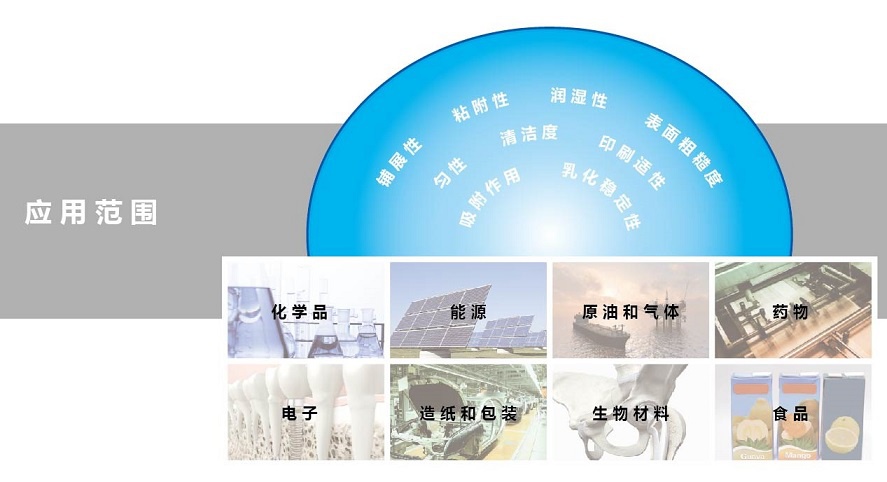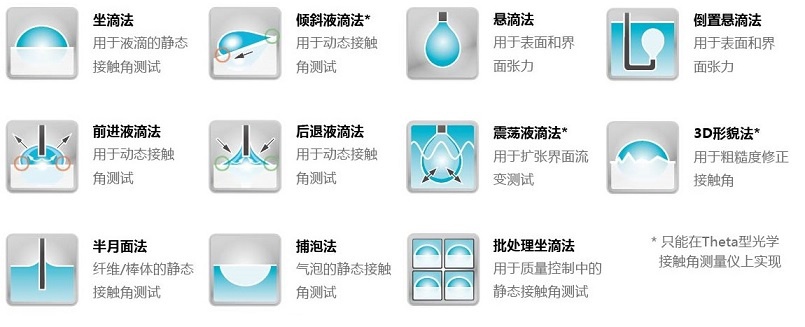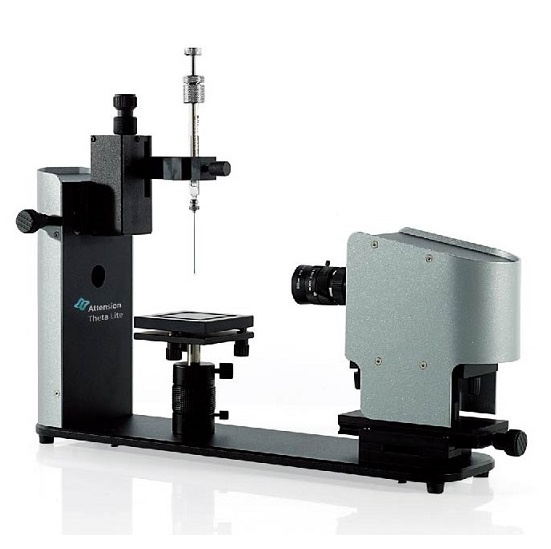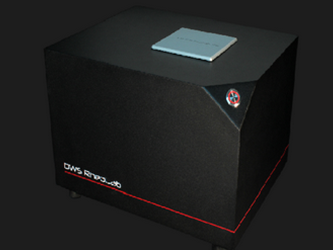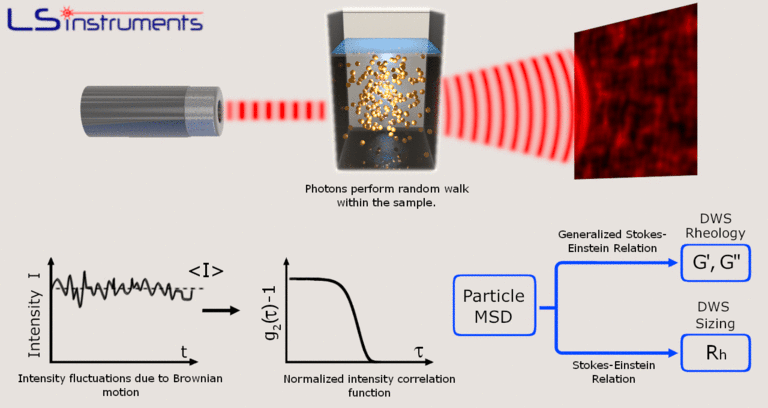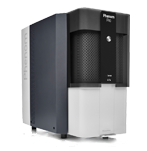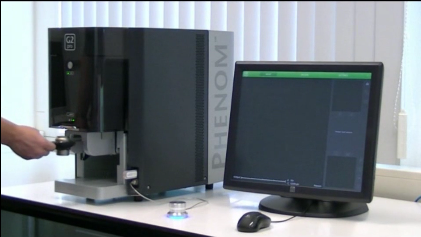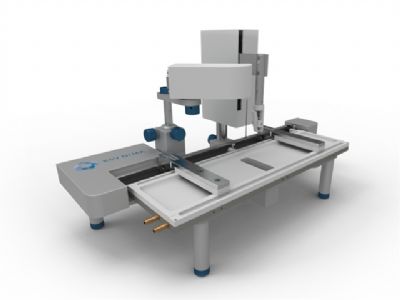| Brief |
| Purpose |
| Motivation |
| Advantage |
| Organization |
| Staff |
| Contact us |
 |
|
|
|||||||||||||||||||||||||||||||||||||
 |
|
|
AnalyzerData:[2017-12-21] Source:
Attension Theta Lite Theta Lite is a compact and accurate contact angle meter for simple measurements of contact angle and surface free energy. It also measures surface and interfacial tension.
Theta Lite measures contact angle, surface free energy, dynamic contact angles, surface tension and interfacial tension. The available drop profiles are: sessile drop, pendant drop, meniscus, captive bubble and reverse pendant drop. Advancing and receding contact angles can also be studied automatically or manually. The instrument comes with a manual sample stage and an automated or manual liquid dispenser, making it a convenient entry-level instrument for research, industrial processes and educational use. Theta Lite has an open design that allows easy manipulation of samples and easy access to the instrument. As an optical instrument, all measurement depends on precision, high-quality imaging and effective analytical software. Attension optical tensiometers use a source of cold monochromatic LED light and a smooth lighting integration sphere that reduces sample evaporation. High image quality is guaranteed with a high-resolution digital camera and rapid data transfer between the computer and the instrument.
The system comes with OneAttension control software for analysis of drop shapes. It uses for example the Young-Laplace equation as a reference method and can fit the entire drop profile. It offers performance and simplicity: Automatic base line detection and drop shape fitting Contact angle on curved surfaces (circular or near-circular) Flexible and programmable frame per second rate recorded by the camera Parameters and experimental settings such as material and liquid used can be saved as recipes for further use OneAttension features an intuitive user interface, live analysis, configurable user groups and accounts and a preset liquid database. Any datapoint or groups of datapoints can be selected, transformed, plotted and analyzed. In-depth analysis takes seconds and data can be easily exported. Measuring chambers, cuvettes and other accessories are available to add capabilities to your Theta Lite.
The DWS RheoLab: From Microrheology to Macrorheology The need to understand the mechanical properties of natural or formulated substances containing small particles has become a main field of interest for many laboratories working on polymers, surfactants, micelles, thickeners, etc. With the DWS RheoLab such crucial information can be accessed conveniently and quickly using a novel principle for optical rheology: The instrument monitors the thermal motion within the sample with nanometer resolution using Diffusing Wave Spectroscopy (DWS) and automatically translates this information into rheological data. This approach is called microrheology and the obtained data can directly be compared to what a conventional mechanical rheometer measures in oscillatory mode in the linear viscoelastic regime.
"Optical microrheology has emerged as one of the most important new techniques to study and characterize rheological properties of complex fluids!"-Dr. Frédéric Cardinaux, Food Colloids, 2007 ※ Fully automated DWS Microrheology ※ Applicable to all homogeneous transparent or opaque samples ※ Fluid with a large range of viscosities from 0.1 mPa∙s to 1000 Pa∙s can be measured ※ Storage and loss moduli G'(ω), G''(ω) in a frequency spectrum 0.1 Hz to 1 MHz (0.1 Hz to 10 MHz with pseudo cross-correlation upgrade) ※ Elasticity range from 1 Pa to 50 kPa ※ Computes the mean square displacement (MSD) of particles ※ Contact-free. No mechanical force applied to the sample: ideal for stability or shelf life studies ※ Monitors time-dependent processes ※ Regulated sample temperature from 4°C to 110°C* ※ Temperature stability < 0.02°C* ※ Compact and robust design ※ Several cuvette sizes available ※ Sample quantity down to 150 μl (for 1 mm thick sample cell) ※ Several options available ※ SParticle sizing at high concentrations ※ Online support forum for all customers
※ Climate controlled room at or below 23o C is required to meet these specifications, minimum temperature cannot be below the dew point. For measurements below the dew point, a dry air source must be connected to avoid condensation. Phenom Pro The Phenom ProX scanning electron microscope (SEM) is based on the 5th generation Phenom desktop SEM platform and is a high-performance SEM for imaging and analysis. With the Phenom ProX desktop SEM, sample structures can be physically examined and their elemental composition determined. Besides point analysis, the optional Elemental Mapping and Line Scan software allows further analysis of the distribution of elements. The Phenom SEM microscopes are intuitive to use, fast to create results and built to high-quality standards. These core principles have been used to develop and create the Phenom ProX spectroscopy system for best-in-class imaging and analysis. Compared to its predecessors, the Generation 5 Phenom ProX SEM has at least a 20% better resolution, and an even better user experience to address a wider range of applications, including samples that are very sensitive to beam damage. Fast identification of different chemical elements in a specimen is accomplished with the Element Identification (EID) software package and a specially designed and fully integrated Energy Dispersive Spectrometer (EDS).
KSV NIMA LB KSV NIMA provides instruments and measurement solutions for the fabrication and characterization of advanced organized thin films with controlled packing density. The most common applications include for example depositing highly controlled nanoparticle coatings and studying biological lipid membranes.
Prev:Light Detection And Ranging Next:3D Priter |
|
